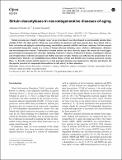Sirtuin deacetylases in neurodegenerative diseases of aging
Author(s)
Herskovits, A. Zara; Guarente, Leonard Pershing
DownloadGuarente_Sirtuin deacetylases.pdf (2.057Mb)
PUBLISHER_CC
Publisher with Creative Commons License
Creative Commons Attribution
Terms of use
Metadata
Show full item recordAbstract
Sirtuin enzymes are a family of highly conserved protein deacetylases that depend on nicotinamide adenine dinucleotide (NAD+) for their activity. There are seven sirtuins in mammals and these proteins have been linked with caloric restriction and aging by modulating energy metabolism, genomic stability and stress resistance. Sirtuin enzymes are potential therapeutic targets in a variety of human diseases including cancer, diabetes, inflammatory disorders and neurodegenerative disease. Modulation of sirtuin activity has been shown to impact the course of several aggregate-forming neurodegenerative disorders including Alzheimer's disease, Parkinson's disease, Huntington's disease, amyotrophic lateral sclerosis and spinal and bulbar muscular atrophy. Sirtuins can influence the progression of neurodegenerative disorders by modulating transcription factor activity and directly deacetylating proteotoxic species. Here, we describe sirtuin protein targets in several aggregate-forming neurodegenerative diseases and discuss the therapeutic potential of compounds that modulate sirtuin activity in these disorders.
Date issued
2013-05Department
Massachusetts Institute of Technology. Department of BiologyJournal
Cell Research
Publisher
Nature Publishing Group
Citation
Herskovits, Adrianna Z, and Leonard Guarente. “Sirtuin Deacetylases in Neurodegenerative Diseases of Aging.” Cell Research 23.6 (2013): 746–758.
Version: Author's final manuscript
ISSN
1001-0602
1748-7838